Baxter Employee and Patient Advocate Recognized for Improving Access to Care for Individuals with Kidney Disease

Baxter Employee and Patient Advocate Recognized for Improving Access to Care f…
James A. Sloand, MD, FACP, FASN, senior medical director and global therapeutic lead for peritoneal dialysis at Baxter, was recently awarded The National Kidney Foundation (NKF) John V. Heher Humanitarian Award, which recognizes an individual that has exemplified the NKF’s mission through outstanding dedication to the kidney community.
With the rollout of the Kidney Early Evaluation Program (KEEP), the NKF’s initiative to bring health screening to underserved communities at risk for kidney disease, Dr. Sloand embraced the opportunity to regularly serve as the nephrologist providing on-site professional counseling and referrals for high-risk individuals. We recently asked him about his efforts to improve early detection and treatment of kidney disease.
From your previous role as a home dialysis director at the University of Rochester to the medical director at the National Kidney Foundation, why did you choose Baxter to continue your work?Dr. Sloand: I went into medicine to help people, which I have been afforded the privilege of doing for nearly 37 years. Baxter allows me to do this on a greater scale by participating in the development and approval of innovative new technologies and products, and by advocating for and enhancing existing therapies for patients with end-stage renal disease, like peritoneal dialysis (PD). For example, I am proud of the work we’ve done in launching AMIA with SHARESOURCE, Baxter’s latest innovation supporting patients on their home-based PD therapy. I also contribute to international education and research initiatives that help advance care for PD patients. At Baxter, I’m making a difference for people around the world.
Your work in medicine also reflects a passion for patient advocacy. Can you tell us a bit about your work in this area?Dr. Sloand: I’ve been engaged with advocacy groups throughout my career because I share their commitment to finding innovative solutions for patients with kidney disease. With the NKF, I found an immediate connection to their work, and led the NFK's medical advisory board to help shape community screening programs, focusing on people in high-risk communities. The work is never done, and I continue to stay actively engaged with them and other organizations directed at improving kidney health. Most recently, I’ve had the opportunity to identify and address barriers to innovation in the kidney space, serving on the board of the Kidney Health Initiative, a partnership between the FDA, the American Society of Nephrology, and other stakeholders including Baxter and the NKF.
In your opinion, what key characteristics help drive innovative outcomes for patients with kidney disease?Dr. Sloand: Whether through product development or collaborations with advocacy organizations, the key to driving effective and meaningful change depends on three things: compassion, commitment and hope. We need to be cognizant of how kidney disease can affect peoples’ lives by putting ourselves in their shoes, with the realization that any of us or our family members might walk in those someday. No matter our role, we need to be committed to making the most of every day by trying to make life even just a little bit better for our patients. Lastly, we must all do our best to change the sense of hopelessness that surrounds the diagnosis of kidney disease. We need to be a source of light for patients and the kidney community, embracing a culture of discovery and innovation as we work to save and sustain lives.

